Digital Poster
Non-Contrast Versus Contrast Perfusion MRI
ISMRM & ISMRT Annual Meeting & Exhibition • 10-15 May 2025 • Honolulu, Hawai'i

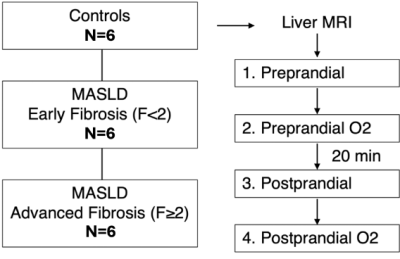 |
Computer Number: 1
3025. Feasibility
of BOLD, TOLD and 4D flow MRI for Assessment of Oxygen
Consumption in Metabolic Dysfunction-Associated Steatotic Liver
Disease
R. do Vale Souza, J. Starekova, T. Colgan, D. Tamada, A.
Roldán-Alzate, K. Johnson, A. Said, G. Knobloch, D.
Hernando, S. Reeder
University of Wisconsin-Madison, Madison, United States
Impact: Oxygen consumption measurements made using
quantitative MRI methods could serve as a potential
biomarker for early, reversible changes in cellular
function/metabolism in MASLD.
|
|
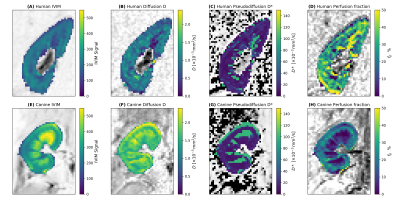 |
Computer Number: 2
3026. Renal
Spatial Profile of IVIM Parameters: Humans and Dogs
L. Sanmiguel, A. Hillaert, P. de Visschere, P. Pullens
Ghent University Hospital, Gent, Belgium
Impact: This study enhances understanding of IVIM
parameter variation across renal regions from cortex to
medulla and cranial-caudal direction in humans and dogs,
providing insights into intrarenal diffusion dynamics and
expands data availability for the IVIM canine community.
|
|
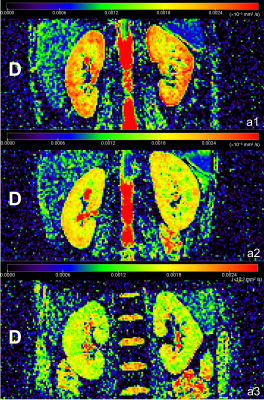 |
Computer Number: 3
3027. Evaluation
of kidney injury using IVIM and DKI MRI in patients with chronic
heart failure
K. Xue, L. Liu, Y. Jiang, O. Darwish, M. Zhang
China-Japan Union Hospital of Jilin University, Changchun, China
Impact: IVIM and DKI provide sensitive biomarkers,
including IVIM-derived renal cortical and medullary
D and DKI-derived medullary MD, which might be valuable for
noninvasively detecting renal injury and its
underlying mechanisms in patients with chronic heart
failure.
|
|
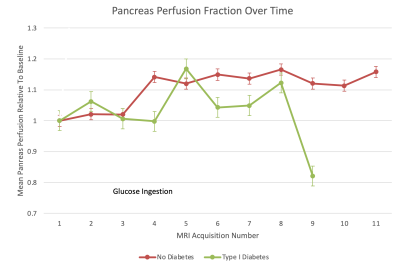 |
Computer Number: 4
3028. Intravoxel
Incoherent Motion (IVIM) MRI of the Human Pancreas Detects
Altered Glucose-Stimulated Pancreas Perfusion in Type 1 Diabetes
C. Wu, I. Harris, A. Mody, P. Kumar, J. Virostko
MD Anderson Cancer Center, Houston, United States
Impact: MRI of pancreas perfusion can improve our
understanding of vasculature dysfunction in diabetes.
Studies in larger populations of participants with diabetes
and those at risk for diabetes may help us better predict
disease onset and evaluate novel therapies.
|
|
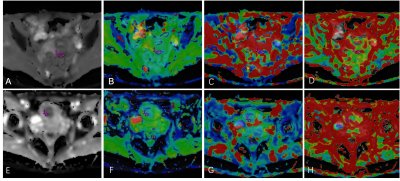 |
Computer Number: 5
3029. The
value of DWI and IVIM for predicting the outcome of
adenomyosis-associated infertile patients before transferring
frozen-thawed embryos
Y. Jiang, X. Li, J. Lian, W. Li, N. Qin
Peking University First Hospital, Beijing, China
Impact: The DWI of adenomyosis before transferring
embryos may have the potential capability to predict the
pregnancy outcome of adenomyosis-associated infertile
patients pretreated by GnRH-a before transferring
frozen-thawed embryos, which need further study.
|
|
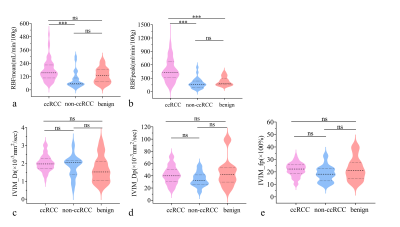 |
Computer Number: 6
3030. Differentiating
between solid benign and malignant renal tumors: does ASL
performed better than IVIM?
M. Gao, S. Li, T. Yin, B. Kühn, Z. Li
Department of Radiology, Tongji Hospital, Tongji Medical College, Huazhong University of Science and Technology, Wuhan, China
Impact: This study suggests that ASL can provide
valuable information for the differential diagnosis of renal
tumors, which is highly significant in guiding optimal
decision-making.
|
|
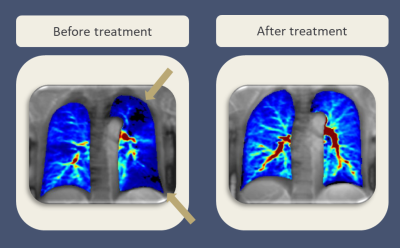 |
Computer Number: 7
3031. Perfusion
imaging with arterial spin labeling (ASL)-MRI for non-invasive
treatment monitoring of patients with acute pulmonary embolism
C. Liang, M. Munz, P. Martirosian, Y. Komma, B. Gückel, R.
Pohmann, K. Nikolaou, M. Gawaz, D. Rath, F. Seith
University Hospital Tübingen, Tübingen, Germany
Impact: Arterial spin labeling (ASL)- MRI demonstrates
the potential to monitor pulmonary perfusion changes in
patients with pulmonary embolism under therapy.
|
|
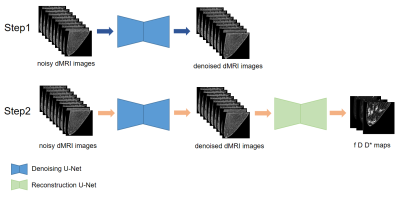 |
Computer Number: 8
3032. A
Cascaded Neural Network for Intravoxel Incoherent Motion Map
Reconstruction
L. Jiang, H. Xie, Y. Yi, L. Chen, A. Wang, G. Yang
East China Normal University, Shanghai, China
Impact: With improved accuracy and robustness, IVIM maps
can be used to assess tissue microstructural properties,
which are critical to diagnosis of diseases, therapy
planning and treatment responses assessment.
|
|
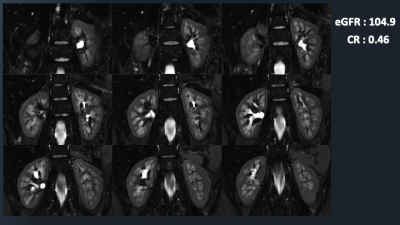 |
Computer Number: 9
3033. 3D
Renal Function Weighted Image using dual inversion recovery
tissue-specific image contrast optimization (DIRECTION)
K. Kodaira, M. Nagao, M. Yoneyama, Y. Katsumata, H. Hamano,
M. kato, T. Ogawa, Y. Hamatani, I. shiina, Y. Goto, S. Sakai
Tokyo Women’s Medical University, Tokyo, Japan
Impact: DIRECTION had the potential to estimate renal
function from the renal corticomedullary contrast ratio more
simply than conventional methods. In addition, it could also
assess anatomy by multi-slices with 3D scan.
|
|
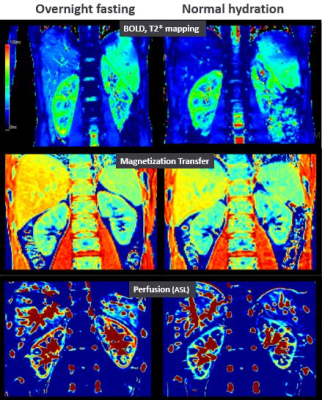 |
Computer Number: 10
3034. Multiparametric
functional MRI of the kidneys in healthy subjects before and
after water intake.
M. Chaika, P. Martirosian, C. Liang, T. Küstner, M.
Schwartz, F. Schick
Department of Diagnostic and Interventional Radiology, Tübingen, Germany
Impact: Our study showed that the multiparametric
functional MRI of the kidneys can help evaluate the renal
function depending on its hydration status and may play an
important role in kidney imaging.
|
|
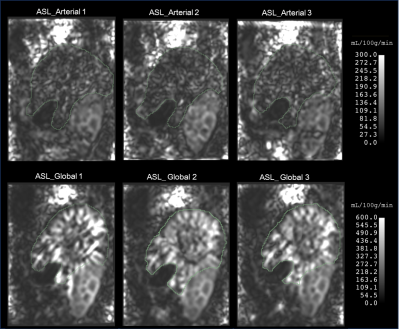 |
Computer Number: 11
3035. Short-Term
Repeatability of Arterial Spin Labeling MRI for Liver Arterial
and Portal Venous Perfusion
R. Wang, P. Ren, Y. Liu, P. Qiao, J. Zhu, B. Kuehn, Z. Wang
Capital Medical University, Beijing, China
Impact: By demonstrating high consistency and low
variability in short-term liver blood flow measurements, ASL
MRI emerges as a reliable and promising noninvasive tool for
diagnosing liver disease.
|
|
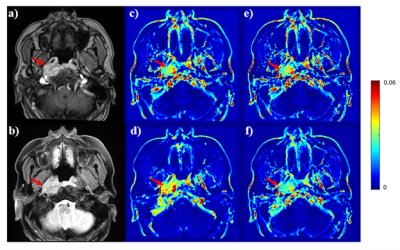 |
Computer Number: 12
3036. Network
structure impacts on quantitative transport mapping network for
compartment model inversion in perfusion image quantification
Q. Zhang, D. Romano, R. Hu, B. Weppner, T. Nguyen, P.
Spincemaille, Y. Wang
Weill Cornell Medicine, New York, United States
Impact: CMUNeXt and attentation U-net improve accuracy
QTMnet based perfusion parameter estimates.
|
|
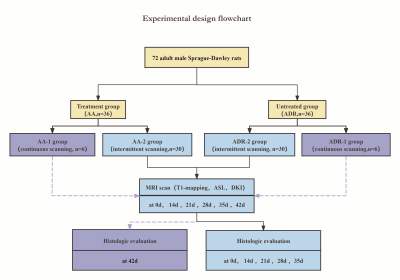 |
Computer Number: 13
3037. Multiparametric
MRI evaluation of early renal fibrosis and therapeutic effect of
asiatic acid in an experimental rat model
X. Wang, L. Chen, Y. Lu, W. Yan, S. Xie, J. Xu, Z. Hu, J.
Zhu, B. Kuehn, R. Grimm, W. Shen
Tianjin First Central Hospital, Tianjin, China
Impact: Multiparametric MRI has the potential to
noninvasively detect early microstructural changes in
patients with CKD before a significant renal functional
decline and can determine proof of activity for evaluating
therapies.
|
|
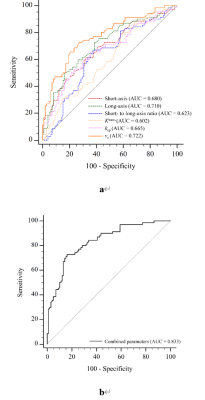 |
Computer Number: 14
3038. Discriminating
tumor deposits and metastatic lymph nodes in rectal cancer with
contrast-enhanced magnetic resonance imaging
X-h WU, Y-t QUE, X-y YANG, Z-q WEN, Y-r MA, Y-z WU, S-p YU,
Y-y LIU, Y. CHEN
Sun Yat-sen Memorial Hospital, Sun Yat-sen University, Guangzhou, China
Impact: A combination of morphological features, DCE-MRI
parameters, and ADC values can assist in preoperative
differentiation between TDs and MLNs in rectal cancer.
|
|
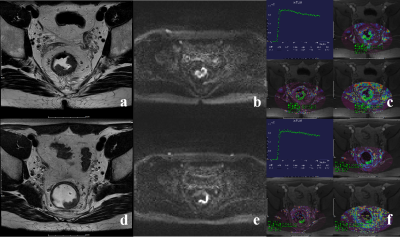 |
Computer Number: 15
3039. The
Role of DCE-MRI in Predicting Pathologic Complete Response After
Neoadjuvant Chemotherapy in Rectal Cancer
W-j FAN, Z-q WEN, Q-m LIU, Y-r MA, Y-y LIU, B-l LU, J-p
YUAN, Y-z WU, S-p YU, Y. CHEN
The First Affiliated Hospital, Sun Yat-sen University; The Seventh Affiliated Hospital, Sun Yat-sen University, Guangzhou, China
Impact: This study highlights DCE-MRI’s potential in
noninvasively predicting complete response in rectal cancer,
supporting personalized, less invasive management and
enabling organ preservation strategies in responsive
patients following neoadjuvant chemotherapy.
|
|
 |
Computer Number: 16
3040. Automatic
Detection of Breathing Motion and Bolus Timing in DCE-MRI of the
Lung to Improve Perfusion Quantification Results
J. Grolig, A. Koeppe, M. Selzer, B. Nestler, S. Triphan, M.
Wielpütz
University Hospital of Heidelberg, Heidelberg, Germany
Impact: The developed CNN for breathing detection in
DCE-MRI allows the robust, automatic identification of
breathing motion. After identification, breathing correction
methods can be applied to the affected frames, which might
improve the comparability of quantitative perfusion metrics.
|
The International Society for Magnetic Resonance in Medicine is accredited by the Accreditation Council for Continuing Medical Education to provide continuing medical education for physicians.